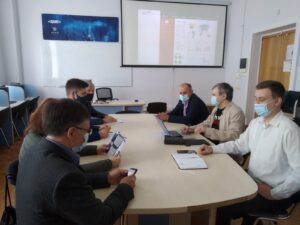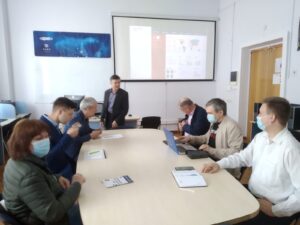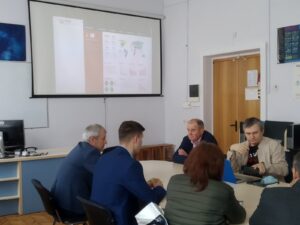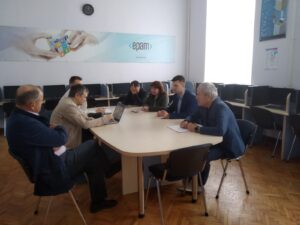A regular workshop was held on May 21 to discuss distance and blended learning introduced in connection with the COVID 19 pandemic.
The seminar was addressed by V.O.Grebenyuk with the report “Analysis of the survey on topical issues of introduction of mixed form of education.”
The working group of which he was a member conducted a survey. More than 120 specialists from 13 free educational institutions of Kharkiv took part in the survey.
Three quarters answered the question “Do you have internally developed documents and procedures for the implementation of mixed education?” – Yes.
Almost 80 percent believe (fully or partially) that a unified platform of DN should be introduced in all educational institutions for the implementation of academic mobility. Among the most important problems were selected technical (68%) and methodological (64%), pedagogical, social and psychological problems were in the second three (over 40%), while only one in five respondents indicated economic problems. Of course, in the first stage, problems with stable servers are very important for all users, and a new look at teaching methods worries teachers in the first place.
The economic block of issues has remained out of consideration, but recently we see that most world leaders (Harvard and MIT) have switched to online learning but do not reduce the size of training contracts, and students demand a refund! This can happen in Ukraine as well.
To the question “Implementation of blended learning requires:” respondents in 62 cases out of 100 stated that it is necessary to change the approaches to teacher workload planning. The transition to a mixed form does NOT reduce the workload because it requires more individual work than mass classroom events such as current lectures. This was also stated by 68% in the answer “Types of teachers’ work” to the next question – what needs to be regulated by regulations.
Therefore, this issue is important and needs to be studied. Paper reporting reduces efficiency, is outdated and harms the environment by increasing the carbon footprint.
Respondents also noted the importance of changing approaches to assessing the quality of education. To some extent, this means moving from statistical self-assessment to the active implementation of ongoing independent surveys of students and employers, creating the conditions to correct the errors and shortcomings identified in these surveys, and developing a system of incentives / penalties.
A quick analysis shows that:
1. It is necessary to involve students in the survey to obtain information from the other side of the educational process
2. Improving the skills and general computer literacy of all participants is a very important first step towards the introduction of modern information forms of blended learning
3. The recommendations of the Ministry of Education and Science on the introduction of blended learning in vocational higher and higher education institutions to some extent answer most of the technical, organizational and methodological issues
4.Economic issues and issues of cooperation (exchange of experience on technical and organizational issues) are open and need to be studied in the near future and in the coming academic years
5. The issue of planning and reporting on the workload of teachers when using a blended form of education is unresolved and poses a threat to inspections by fiscal authorities. This question must be answered first.
6. The issue of administration of the educational process at the level of the department, faculty, university needs to be resolved in the near future.
In his closing remarks, Rector Valery Semenets noted that despite the devastating impact of the pandemic and quarantine restrictions on all spheres of life and the achievement of the Sustainable Development Goals, including the University, the University has adequately responded to this challenge. And our main mission is quality education, provided in full, at a high level.
The Rector thanked the working group and supported the decision to send the proposals of the working group on the implementation of blended learning to the heads of universities in the Kharkiv region and the Ministry of Education and Science of Ukraine.




